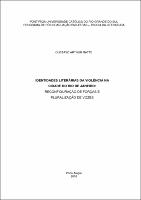| Share record |


|
Please use this identifier to cite or link to this item:
https://tede2.pucrs.br/tede2/handle/tede/6563| Document type: | Dissertação |
| Title: | Identidades literárias da violência na cidade do Rio de Janeiro : reconfiguração de forças e pluralização de vozes |
| Author: | Matte, Gustavo Arthur  |
| Advisor: | Amodeo, Maria Tereza |
| Abstract (native): | Usando as reflexões acerca da “dialética da marginalidade” (João César de Castro Rocha) em oposição à “dialética da malandragem” (Antonio Candido), este estudo faz um mapeamento de espaços sociais que passaram a progressivamente reivindicar e ocupar lugar de fala na literatura brasileira contemporânea – frequentemente em torno do tema da violência urbana. Parte-se do pressuposto de que o primeiro espaço a ser ocupado foi o da periferia, quando Cidade de Deus surgiu como um panorama literário da favela construído a partir de dentro, através de uma perspectiva de classe. Por ser um fenômeno novo no campo da literatura brasileira, propondo um desafio direto à centralidade cultural de um Rio de Janeiro turístico e com tendências homogeneizadoras – diretamente vinculado à sua Zona Sul –, o romance Cidade de Deus (1997), contando com a amplificação resultante da aparição do filme homônimo em 2002, pautou a necessidade de uma reconfiguração de forças e uma pluralização de vozes nos campos cultural e literário brasileiros. A partir da influência de Cidade de Deus surgiram não apenas casos de outros escritores periféricos como Ferréz, em São Paulo, mas também consequências indiretas, a exemploda necessidade de outras vozes sociais se posicionarem – ou reposicionarem. Desenvolvo, então, uma reflexão acerca dos lugares de fala que passaram a atuar enfaticamente nesse sentido, através de publicações diversas. Esses lugares são: centro; periferia; polícia; presídio. Utilizando ao menos uma narrativa que represente cada ponto do espectro1, o que pretendo com o estudo é identificar posições de classe em cada uma delas, de maneira a perceber o tipo de resposta dada ao desafio da “marginalidade” por diferentes atores sociais através da literatura. |
| Abstract (english): | OpposingJoão César de Castro Rocha’s thinking on the so called “dialectic of marginality” to Antonio Candido’s “dialectic of malandragem”, this study maps the social spaces which started to gradually claim and occupy a lieu of speech in the context of Brazilian contemporary literature – often around the theme of urban violence.It starts from the assumption that the first space to be occupied was that of urban peripheries, when Cidade de Deus emerged as a literary panorama of the slum from inside, using its ownsocial class perspective. Since it was a new phenomenon in the field of Brazilian literature, and since it poses a direct challenge to the cultural centrality of a touristic and homogeneous Rio de Janeiro (related to the South Zone of the city), Cidade de Deus (1997) –subsidized by the great success of the eponymous movie (2002) –highlighted the urgencyof a reconfiguration of forces and a pluralization of voices in the Brazilian cultural and literary fields. Under the influence of Cidade de Deusnot only cases of other peripheral writers appeared (such as Ferréz in São Paulo), but also indirect consequences were felt, for example: the necessity of other social voices to configure or reconfigure their participation in the system.Based on this particular reasoning, I have thus made speculations about the spaces of speech that started to act strongly through various publications. These spaces are: center; periphery; police; prison. Taking into account at least one narrative representing each of the points2, my intentions with this study are to identify perspectives of social classes in each of them, in such a way that we can understand how is that they answer to the “marginality challenge” by means of literature. |
| Keywords: | VIOLÊNCIA URBANA MARGINALIDADE CLASSES SOCIAIS TEORIA LITERÁRIA LITERATURA E SOCIEDADE LITERATURA BRASILEIRA - HISTÓRIA E CRÍTICA |
| CNPQ Knowledge Areas: | LINGUISTICA, LETRAS E ARTES::LETRAS |
| Language: | por |
| Country: | Brasil |
| Publisher: | Pontifícia Universidade Católica do Rio Grande do Sul |
| Institution Acronym: | PUCRS |
| Department: | Faculdade de Letras |
| Program: | Programa de Pós-Graduação em Letras |
| Access type: | Acesso Aberto |
| URI: | http://tede2.pucrs.br/tede2/handle/tede/6563 |
| Issue Date: | 15-Jan-2016 |
| Appears in Collections: | Programa de Pós-Graduação em Letras |
Files in This Item:
| File | Description | Size | Format | |
|---|---|---|---|---|
| DIS_GUSTAVO_ARTHUR_MATTE_COMPLETO.pdf | Texto Completo | 1.79 MB | Adobe PDF |  Download/Open Preview |
Items in DSpace are protected by copyright, with all rights reserved, unless otherwise indicated.




